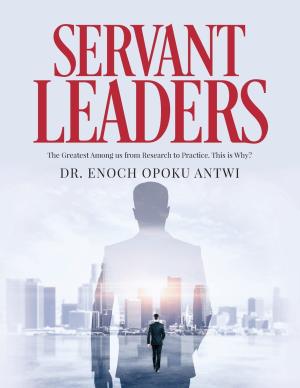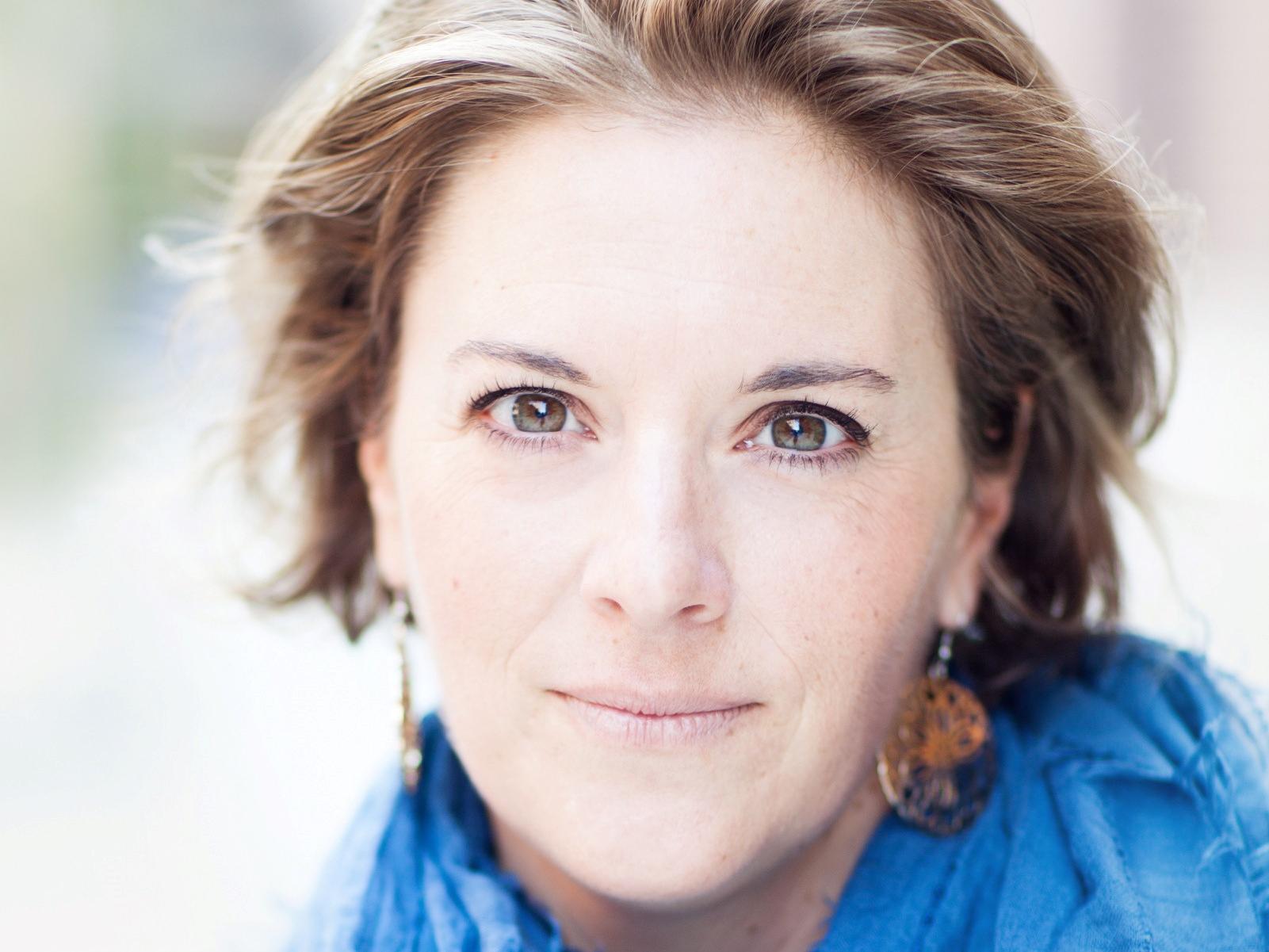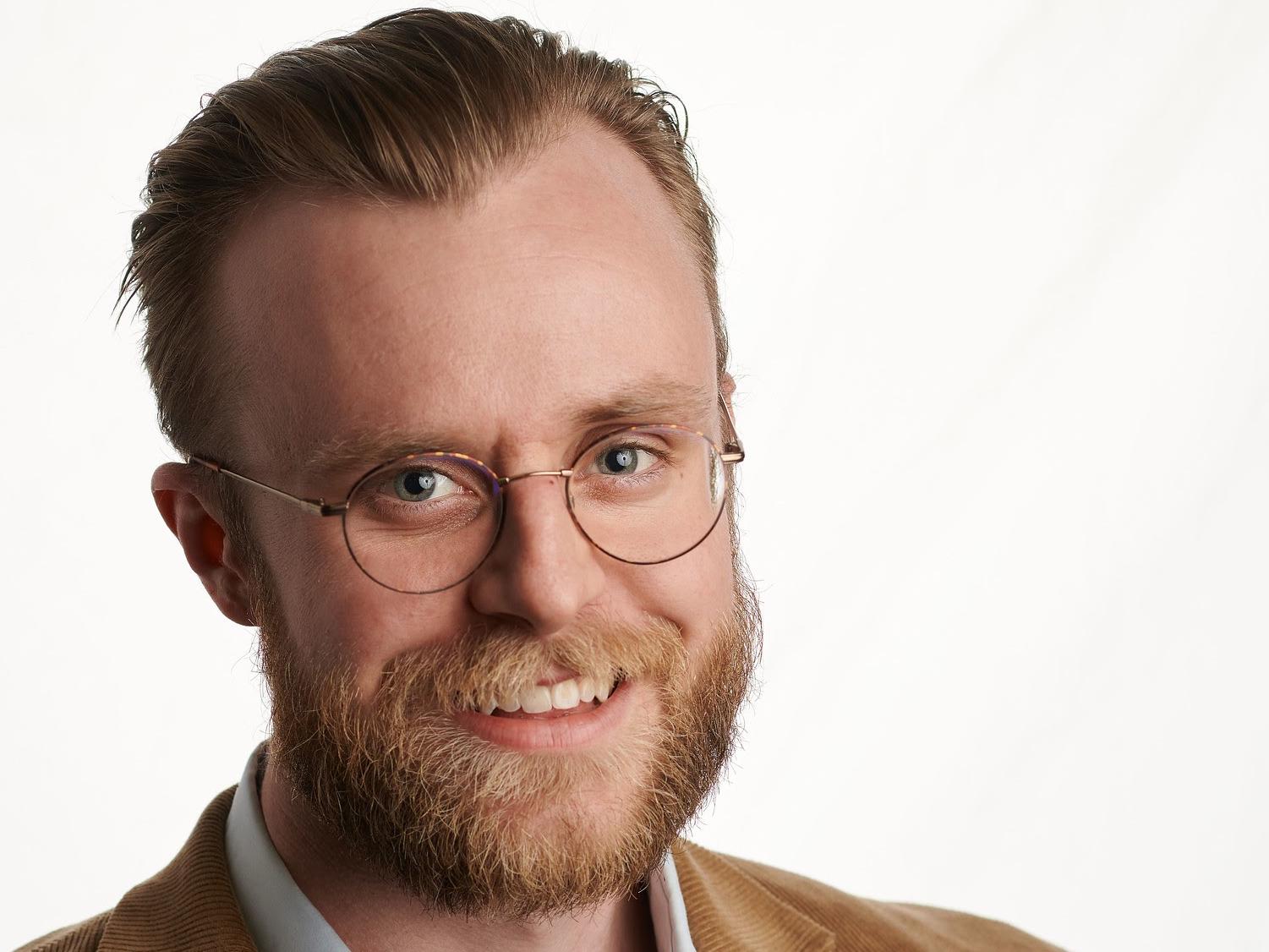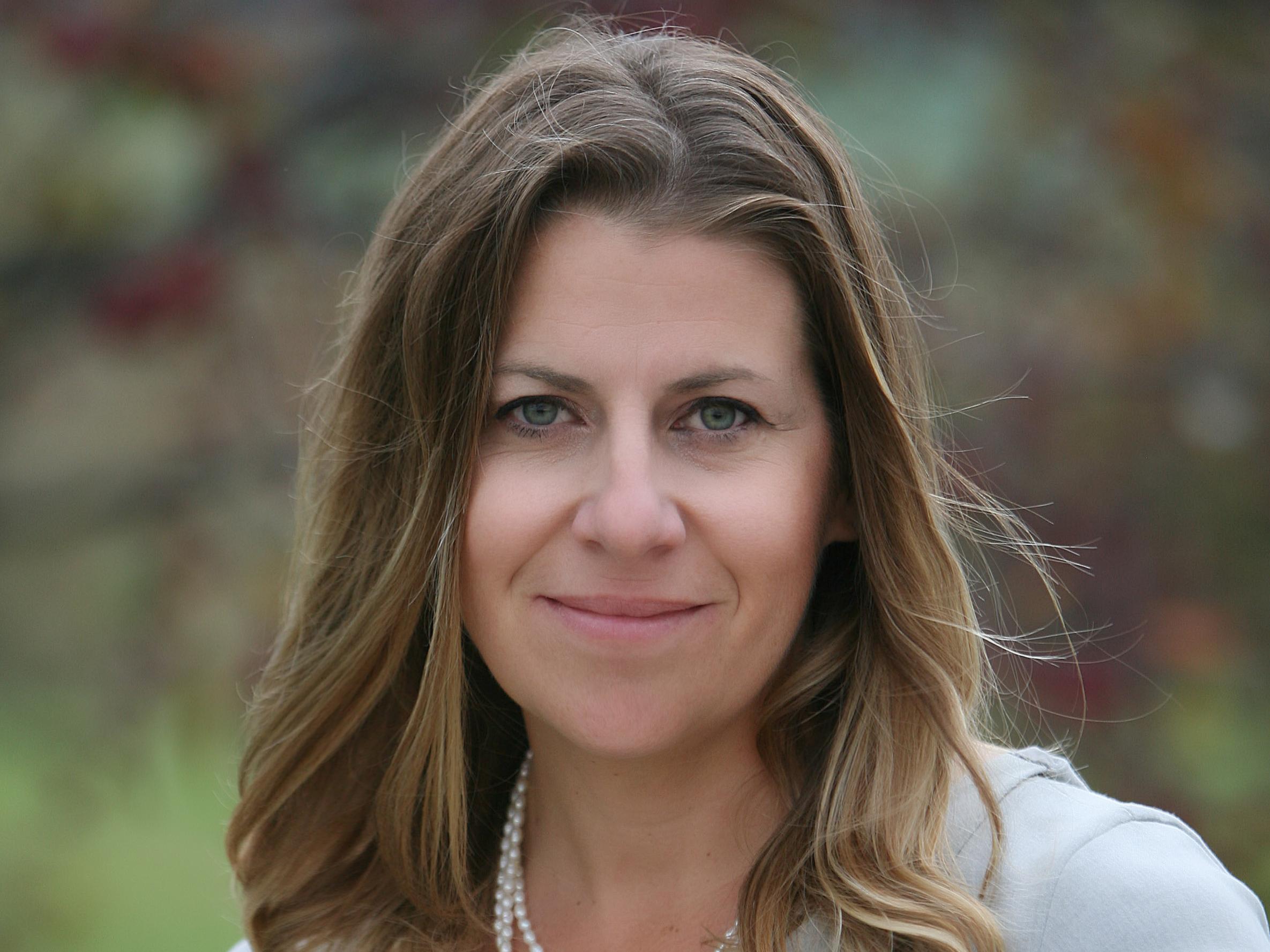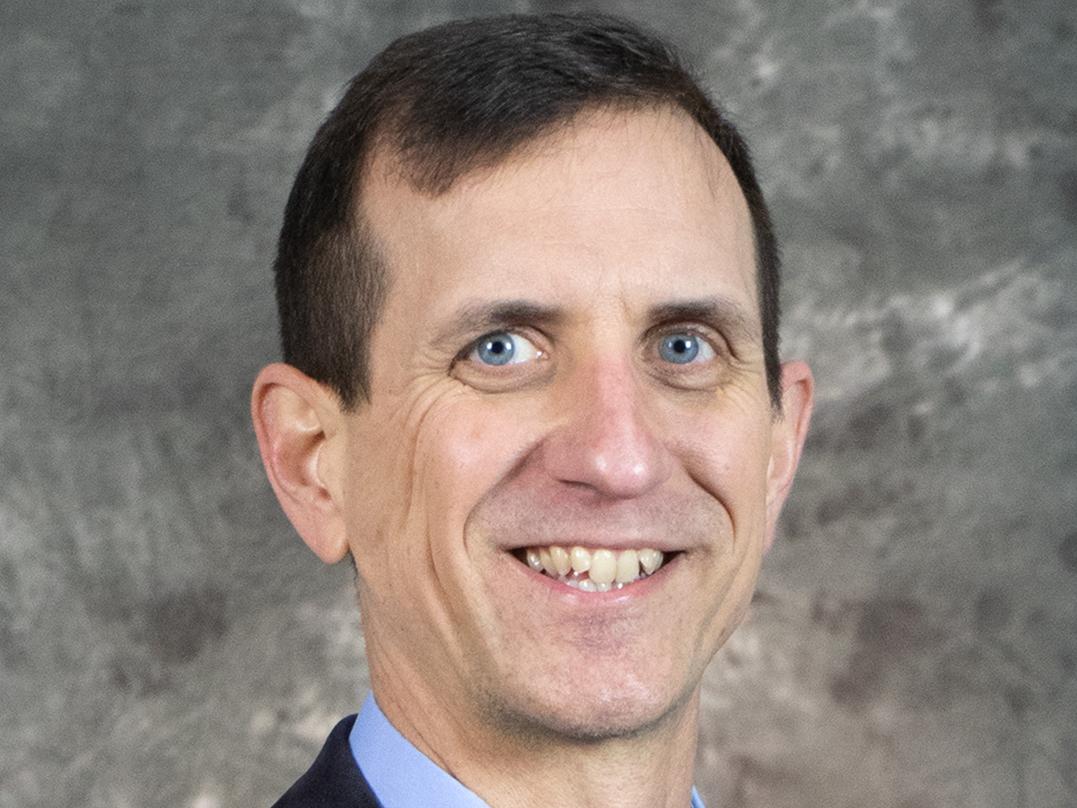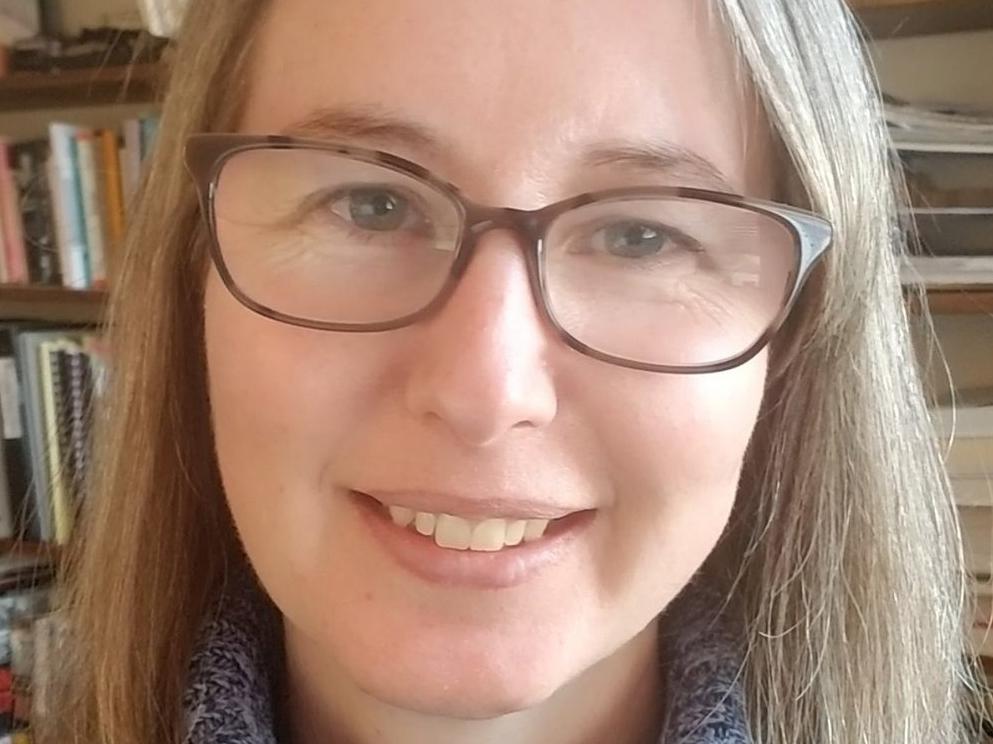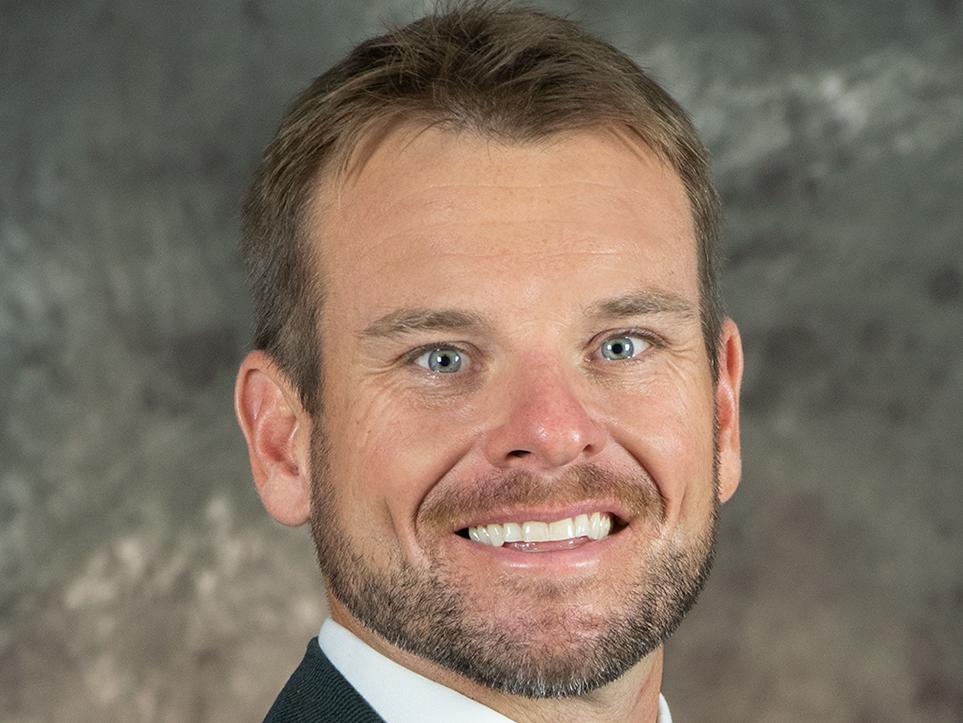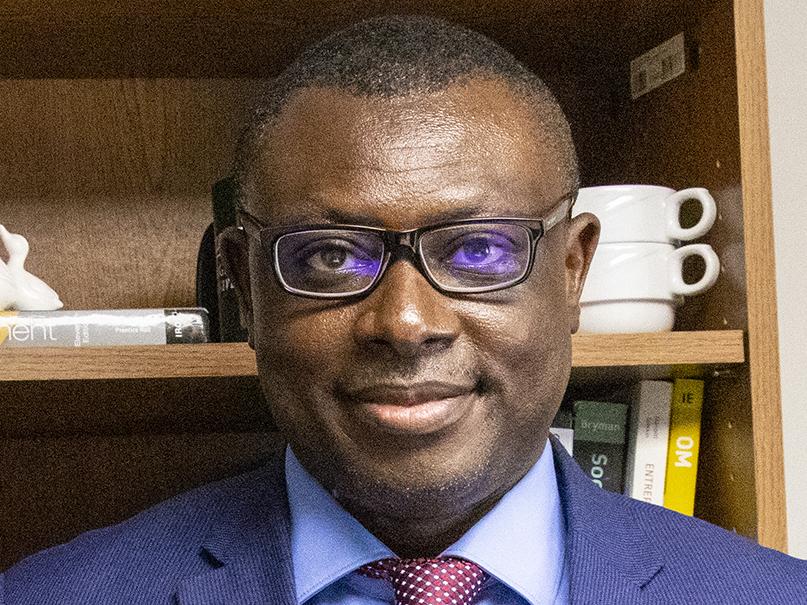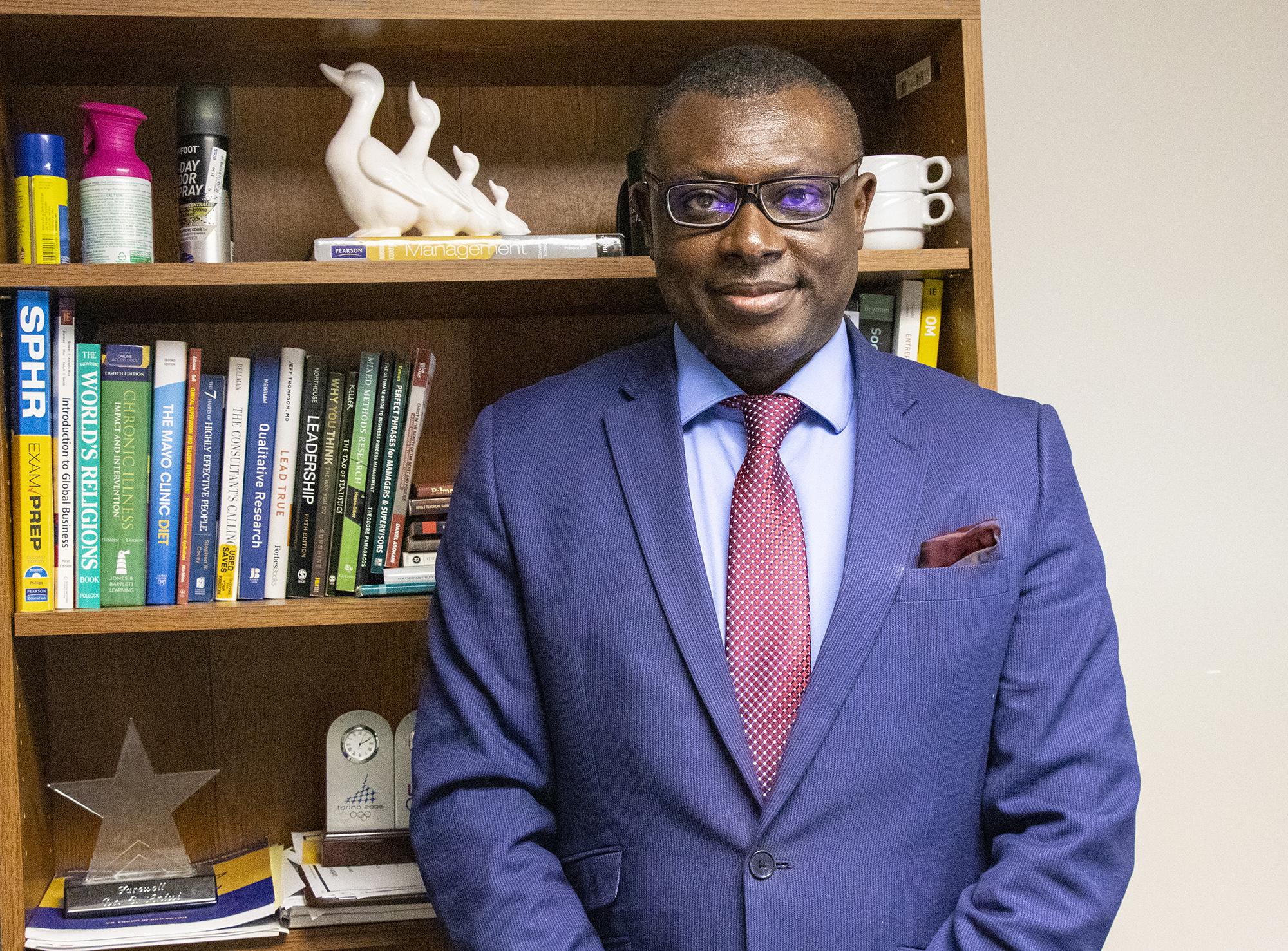
Enoch Opoku Antwi, now in his third year teaching leadership and management in Viterbo University’s Dahl School of Business, grew up in Ghana, the oldest son in a family of five children. After his parents divorced, he stepped up to be a breadwinner and father figure, his first step toward a life devoted to studying and teaching leadership.
Although he hasn’t always been a teacher, most of the work he has done in his life, including running the business consulting firm he started in 2000, has involved teaching and training. Enoch means “dedicated teacher,” and he taught a class of 61 fourth graders in Ghana before he even started college.
Antwi earned a bachelor’s degree in educational psychology from the University of Cape Coast in Ghana, going on to earn master’s and doctoral degrees in leadership studies from Mount St. Joseph University and Indiana Wesleyan University, respectively.
In addition to his work in higher education, which started in 2011, Antwi shares his expertise and perspectives on leadership with audiences around the world through in-person visits, webinars, and other virtual presentations. He’s especially devoted to improving the quality of leadership in Ghana and the rest of the African continent, serving as a mentor to leaders and pushing for the adoption of servant leadership. During the last holiday break, Antwi returned to Ghana for a presentation at the Sundoulos Advanced Leadership Training Institute, which conferred upon him the title of global goodwill ambassador for leadership and diplomacy.
Antwi, who lives in Holmen with his family, has published five books. The most recent is titled Servant Leaders: The Greatest Among Us from Research to Practice.
How (and/or why) did you come to be at Viterbo?
I moved to Wisconsin in fall 2016 to teach in the Chippewa Valley Technical College leadership program in Eau Claire, leading the organizational leadership program. I designed 12 leadership courses for the program, introduced the Summer Institute, and invited leaders in the community to share ideas with seniors before they graduate. Also, I was the faculty advisor of the ACBSP accreditation’s Honor Society group, Kappa Beta Delta.
It was at the Tech that Viterbo’s path crossed with mine. After three years, I applied to be an assistant professor at the Dahl School of Business and was offered the position by Tom Knothe, then dean. During my interview, the faculty, students, VP of academics, and president all told me “you will be a great fit for our institution.” I was given an offer immediately after the 10-hour marathon interview process.
I believe I left the Tech leadership program better than I found it, and I devote myself to doing the same at Viterbo. I strive to be a walking example of servant leadership, and teaching it comes naturally.
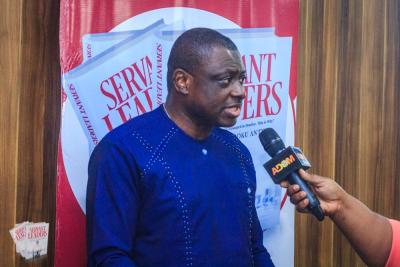
What do you love most about teaching at Viterbo?
The values of contemplation, hospitality, integrity, service, and stewardship. I have always wanted to teach in a Christian institution because for me, spirituality is not private, but public. The Franciscan Sisters of Perpetual Adoration have never ceased in praying for this community and the world, and that motivates me every day. The power of contemplation, that is, reflecting upon the presence of God in our lives and work, is paramount in leadership. I pray before doing virtually anything.
In my entire life, people will always say thank you when you let them know that you will be praying for them. It doesn’t matter their faith or religion. Thus, prayer is quite universal. Besides, I understand my calling to teach and serve from the heart is embedded in stewardship of my time, talent, and little treasure. Moreover, the class size, family feeling of faculty, staff and students, and the mission of the university in preparing students for faithful service and ethical leadership is lovely and inviting.
As a liberal arts institution, we help students understand how to ask questions, not just teach them answers. Voltaire puts it better, “Judge an individual by the quality of their questions rather than their answers.”
What inspires you?
I draw inspiration from within myself. For me, God is first, family second, and country third. My conscience and the knowledge of how far God has brought me inspires me to motivate others to be resilient, believe in their talents, and commit to excellence. I am more inspired if God blesses others through me with my knowledge, wisdom, and resources. Recognition, praise, empty glories, and appreciation do not motivate me because I am a servant leader and do my work in silence. Opportunity for growth, new challenges, meaningful work, and job satisfaction are constructs I have my hands on when it comes to inspiration.
What advice would you give to students regarding heading out into “the real world”?
Students today live in a complex world. Luckily for them, we are shifting from the 20th century vertical leadership style of top down, chain of command, span of control, controlled information, and knowledge is power, to 21st century horizontal leadership of reduced hierarchy, emphasized collaboration, focus on coordination, shared information, and creating new knowledge.
The world’s complexity comes from three constructs: interdependence, diversity, and ambiguity. Managing diversity, interdependence, and ambiguity on a global scale is difficult enough. It becomes highly challenging when the speed of change is accelerating and the direction of change is less certain. We call this Fast Flux. To lead through the flux, students must head into the world with a “Glocal” mindset. That means, think global, act local.
Moreover, they should let their lives speak (Parker, 2000). Being authentic, communication savvy (reading and writing), believing in their capabilities, and having the will to do the right thing is where their intentions and actions meet to succeed in the real world.
Finally, they should make the right choices. Jim Hunter says, “In the end, what we are and the people we have become, is to a great extent the results of our choices, past and present.” Remember even God, the Creator, does not interfere in our choices. Yet, in every choice we make, there is a price to pay for the forgone alternative (opportunity cost). Therefore, make wise career and relationship choices as you head into the real world.
Do you have a little-known fun fact about yourself that would surprise students?
Well, I am left-handed and left-footed as well. My everything is left. I used to be a good soccer player, but I broke my ankle in high school, which kept me out of school for almost a semester. The funny part is that my grandmother, with whom I was staying, had no money to take me to the hospital and resorted to traditional medicine. My ankle healed eventually, but my foot bent to the right, not straight anymore.
What do others say about you?
Those who know me say two things define me, and they know two things I do not tolerate. I am open and collaborative, but I do not entertain drama and confusion. I don’t get angry. I stay out of trouble, and I am always calm.
Tonya Wagner, dean of Viterbo’s College of Business, Leadership, and Ethics, had this to say: “Professor Antwi is a walking example of what it means to be a leader. In his classroom there’s such a sense of trust, and that’s not something you always see. His students really appreciate him. They’re engaged. They kind of hang on his words. In addition, everything he does he does with a sense of commitment to his community, and ‘community’ is broadly defined. He has these interlocking worlds and each life that he leads bolsters his other lives.”
One student had this to say: “He is amazing. He cares about his students and their learning. At one point I had some very personal issues going on, and Professor Antwi was both understanding and accommodating. A wonderful teacher and wonderful human being.”
